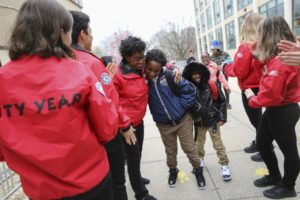
This originally appeared on WBUR on July 21, 2020.
By Jim Balfanz and AnnMaura Connolly
Are we doing everything we can to fight the pandemic? Or are we ignoring obvious opportunities to help our communities survive and recover from this disaster?
Right now, Congress has a chance to support local communities overwhelmed in the wake of COVID-19 by supporting the CORPS Act, recent legislation that would expand national service programs where they’re needed most.
You’ve probably heard of AmeriCorps. It’s a network of national service programs, established more than 25 years ago, that has supported communities in disaster response, education, public health and conservation. Today, more than 75,000 men and women — most of them in their 20s — are completing up to a year of service. Many of the organizations that comprise the AmeriCorps national service network are already taking an active role to help communities respond to the pandemic, including the education nonprofit that we lead, City Year.
The CORPS Act could be a lifeline for communities struggling to slow the spread of the novel coronavirus, care for the sick, help families put food on the table and support schools that face formidable challenges this fall. It can open doors for young adults facing an abysmal job market and provide an alternative for students considering a gap year in the hope of returning to college once campus life normalizes.
In the tradition of past work relief campaigns like the Depression-era Civilian Conservation Corps, the CORPS Act would triple AmeriCorps’ pool of recruits over three years to 250,000 young adults. The legislation would also increase stipends for AmeriCorps members and boost the value of the Segal Education Award for serving.
These investments would allow more young people to consider national service in their own communities, knowing they would be able to afford to pay their living expenses and have money to defray education costs. The $16.6 billion proposal is a tiny percentage of the $2 trillion cost of the CARES Act stimulus relief package passed by Congress in March, and an even smaller fraction of the $3 trillion HEROES Act passed by the House in June.
Since the outbreak of the novel coronavirus, AmeriCorps and Senior Corps members have pivoted quickly to address gaps in services and persistent inequities in access to healthcare, housing and education that have only been exacerbated by COVID-19. They have delivered millions of meals, conducted hundreds of thousands of wellness checks, expanded access to health screenings, set up temporary isolation sites, organized blood drives and supported distance learning.
When school buildings shuttered this spring, thousands of City Year AmeriCorps members who had been serving full-time in classrooms, including here in Boston, rapidly adapted to support teachers and students. They answered questions in chats during teachers’ virtual sessions, reached out to students who weren’t logging on, and alerted school officials if families needed internet access or laptops.
Jordan Kettle, a City Year AmeriCorps member who served with BPS last year, says students “were experiencing stress none of us have ever encountered before” as the result of the pandemic. “Even after we were no longer able to connect with our students in person, the ability to spend time together on video or phone calls gave us the chance to continue supporting them and reminding them how important they are to us,’’ she says. Kettle is returning for a second year of national service this fall.
Imagine more schools being able to rely on AmeriCorps members like Kettle to recreate the sense of safety, routine and connection that students dealing with stress or trauma will need before they may be able to catch up on lost learning time. This is just one example of how the CORPS Act can help our nation get back on its feet.
Some critics may say that money is better spent by cutting states a check. And to be sure, expanding civilian service can’t be the only step, but it should be one piece of an ongoing and robust response. And because there’s an existing network of cost-effective and targeted programs — that are already working closely with community leaders — it’s hard to fathom why we wouldn’t move quickly to deploy this army of goodwill.
We’ve all seen recently how young adults are reshaping our nation through their leadership of protests to demand racial justice. This is a generation-defining moment. Let’s make sure there is ample opportunity for their commitment, energy and passion to drive pandemic recovery efforts.